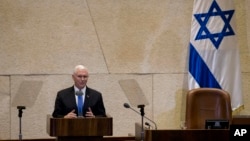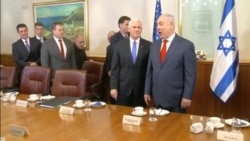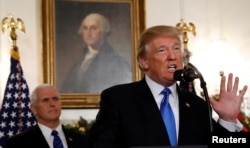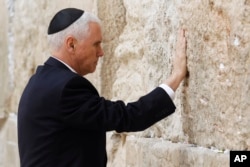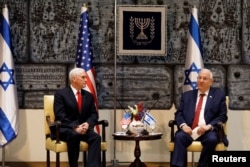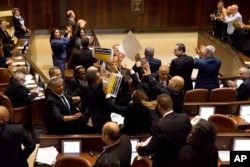The United States said Tuesday it hopes to unveil a Middle East peace plan later this year, but Vice President Mike Pence says that depends on the Palestinians' willingness to return to negotiations with Israel.
As Pence ended a three-day Middle East trip, he told the Reuters news agency, "The White House has been working with our partners in the region to see if we can develop a framework for peace. It all just depends now on when the Palestinians are going to come back to the table."
A senior White House official told reporters in Jerusalem that U.S. negotiators are reluctant to insist on a timeline because past deadlines for negotiations have often been missed.
WATCH: Pence ends Middle East trip
"It'll come out both when it's ready and when both sides are actually willing to engage on it," the White House official said, speaking on condition of anonymity.
Pence said in the Reuters interview that he and President Donald Trump believe the decision to move the U.S. embassy in Israel from Tel Aviv to Jerusalem would boost peace-making possibilities. Palestinian leader Mahmoud Abbas denounced Trump's December announcement about moving the embassy and refused to meet with Pence on the vice president's trip. Pence said in a speech Monday before the Knesset, Israel's lawmaking body, that the United States would move the embassy by the end of 2019.
Pence repeatedly stated during his trip that the U.S. considers Jerusalem the Israeli capital, a break from long-standing U.S. policy, although he reiterated American policy that final borders in any creation of a Palestinian state must be negotiated. Palestinians also say they consider east Jerusalem to be their eventual capital.
‘Very inspiring’
The U.S. vice president visited Jerusalem's Western Wall, one of Judaism's holiest sites. Wearing a black skullcap, Pence inserted a piece of paper inside a crack in the ancient stone wall with a prayer, as is tradition for visitors.
"It is my great honor to pray here at this sacred place," he wrote. "God bless the Jewish people, and God bless the state of Israel always."
After walking away from the wall, Pence said the quiet moment was "very inspiring."
Pence's wife, Karen, visited the wall separately, as required by the ultra-Orthodox Jewish authorities who govern the site, among the last remnants of the second Jewish temple destroyed by the Romans in 70 AD. It is in east Jerusalem, occupied by Israel in the Six-Day War of 1967 and later annexed by the Israelis, but never recognized by the international community.
On his final day in Israel, Pence and his wife also visited the Yad Vashem Holocaust memorial in Jerusalem, along with Israeli Prime Minister Benjamin Netanyahu and his wife, Sara. The museum has displays remembering 6 million Jews killed during the Holocaust of World War II.
In talks with Israeli President Reuven Rivlin, Pence reiterated the Trump administration's view that the international deal on Iran's nuclear program should be changed. Pence said the U.S. is sending a signal to its European allies about the need to alter the 2015 agreement that brought sanctions relief to Iran in exchange for limiting the country's nuclear program to ensure it would not develop nuclear weapons.
Trump and Israeli leaders have objected to the agreement, arguing Iran got too much while giving up too little.
Negotiators from the United States, Britain, China, France, Russia and Germany all worked to reach the deal with Iran. European leaders have defended the deal as working, including citing the conclusions of the International Atomic Energy Agency, the U.N. nuclear watchdog agency in charge of monitoring Iran's compliance.
The European Union has also expressed its support for continuing to seek a two-state solution in negotiations with Israel and the Palestinians with Jerusalem as a shared capital.
EU foreign policy chief Federica Mogherini reassured Abbas of that position during talks Monday.
Randolph-Macon College history professor Michael Fischbach said it is not surprising to see a difference in U.S. and European positions.
"I think the Europeans, and indeed most of the world community, for a long time have had very different visions for how Israel and the Palestinians should forge a lasting peace, a vision based on internationally accepted norms, based on international law, based on U.N. resolutions. And that has been quite at odds with United States policy over the decades and most recently as expressed by President Trump," Fischbach told VOA. "What will be interesting is to see whether the Europeans actually move forward and propose some sort of alternative peace process."
‘Historic statement’
Trump's decision parted from long-standing U.S. policy that left the status of Jerusalem as an issue to be resolved by Israeli and Palestinian negotiators.
Netanyahu thanked Trump and Pence for what he called the "historic statement" and declared the U.S.-Israel relationship has "never been stronger." He later told reporters that the sooner the Palestinians "accept the truth" about Jerusalem, the sooner the two sides can reach an agreement "that will create a better future for both our peoples."
On Monday, a group of Arab lawmakers greeted Pence's Knesset speech with protests and signs that said, "Jerusalem is the capital of Palestine," before being removed from the chamber.
Palestinian chief negotiator Saeb Erekat called Pence's words "a gift to extremists" and proof that the Trump administration "is part of the problem rather than the solution."
"His message to the rest of the world is clear: Violate international law and resolutions, and the U.S. will reward you," Erekat said.




